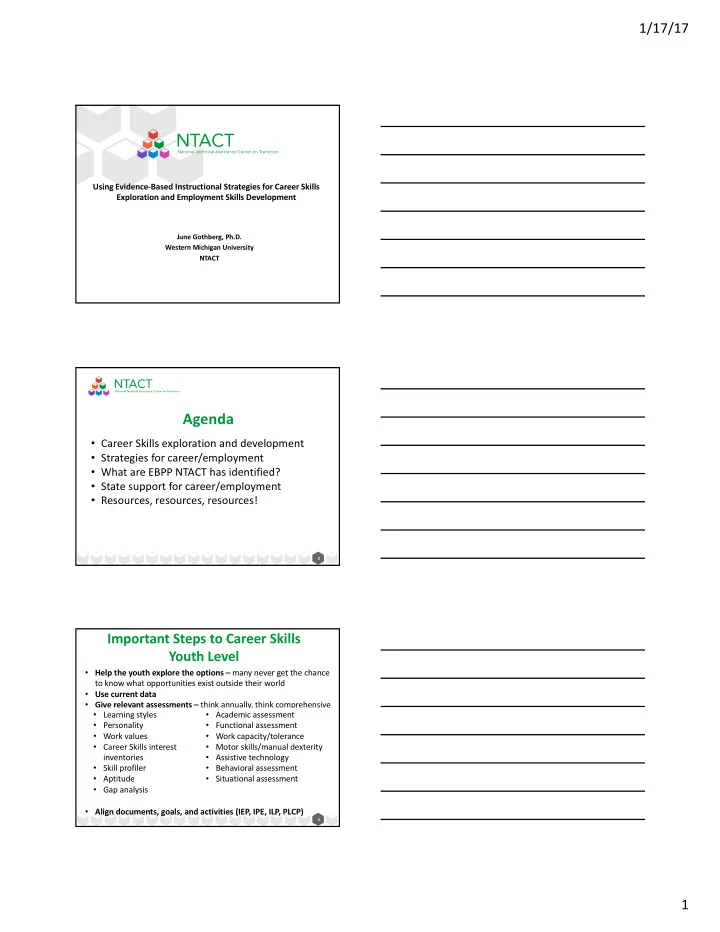

1/17/17 Using Evidence-Based Instructional Strategies for Career Skills Exploration and Employment Skills Development June Gothberg, Ph.D. Western Michigan University NTACT Agenda • Career Skills exploration and development • Strategies for career/employment • What are EBPP NTACT has identified? • State support for career/employment • Resources, resources, resources! 2 Important Steps to Career Skills Youth Level • Help the youth explore the options – many never get the chance to know what opportunities exist outside their world • Use current data • Give relevant assessments – think annually, think comprehensive • Learning styles • Academic assessment • Personality • Functional assessment • Work values • Work capacity/tolerance • Career Skills interest • Motor skills/manual dexterity inventories • Assistive technology • Skill profiler • Behavioral assessment • Aptitude • Situational assessment • Gap analysis • Align documents, goals, and activities (IEP, IPE, ILP, PLCP) 3 1
1/17/17 Important Steps to Career Skills Youth Level Example: Career Skills Guidance Washington resources 6 th -12 th grade http://bit.ly/WAcskg 4 Important Steps to Career Skills Youth Level Example: University of Oregon’s Employability Skills Survey 5 Important Steps to Career Skills Youth Level Example: Montana’s Big Sky Pathway gap analysis tools http://bit.ly/MTBSPGap 6 2
1/17/17 Important Steps to Career Skills Youth Level • Validate youth voice – use it to facilitate the career choice process • Just because they say they want to do something that seems impossible or irrelevant, doesn’t mean you can’t use that to make a good plan • Make school relevant!! - youths should see the clear link between their program of study and postsecondary goals • Take those “why do I have to do this” questions seriously • Promote career certifications • CTE certifications • WorkKeys – National Career Skills Readiness Certificate 7 Important Steps to Career Skills Youth Level Example: Michigan Dream Night http://bit.ly/MIasppire 8 Important Steps to Career Skills Youth Level Example: WorkKeys certification requirements 9 3
1/17/17 Important Steps to Career Skills Youth Level • Include relevant people support • Include parents • Include and use school counselors • Include and use vocational rehabilitation • Include CTE and vocational education • Explore using mentors (employers, college youths, peers ) 10 Parents Example: I Have a Plan Iowa Parent Plan of Study Approval http://bit.ly/IAPlanApproval 11 Parents Example: Autism Speaks Family Services Employment Toolkit http://bit.ly/2dGwbnr 12 4
1/17/17 Important Steps to Career Skills System Level • Create a career education continuum – create a schoolwide scope and sequence to career exploration and development starting no later than early middle school • Create courses specific to career planning • Connect with your community – there is no better way to create opportunities for your youths than through relationships • Educate your community about • graduation pathways – what does a certificate mean? • hiring youth and young adults with disabilities 13 Important Steps to Career Skills System Level Example: Arizona’s K-12 youth level checklists http://bit.ly/AZk12careercheck 14 Important Steps to Career Skills System Level • Invite businesses and community groups to join the Transition Council • Join your local Chamber of Commerce - send representation • Annual appreciation – provide meaningful recognition • Provide ongoing support to businesses, youths, and families 15 5
1/17/17 Important Steps to Career Skills System Level Example: Windsor Works Alliance (Colorado) http://bit.ly/WorkAlliance 16 NTACT Taxonomy for Transition Programming 2.0 http://bit.ly/NTACTtaxonomy 17 NTACT Five Main Employment EBPPs 18 6
1/17/17 NTACT Transition EBPPs http://bit.ly/NTACTPinterest 19 NTACT EBPPs http://bit.ly/NTACTPinterest 20 NTACT RBP Employment Strategies Three research-based strategies to improve SA/SD • Self-Advocacy Strategy (Van Reusen, Bos, Schumaker, & Deshler, 1994 ) • Self-Directed IEP( Martin, Marshall, Maxson, & Jerman , 1996) • Whose Future is it Anyway?( Wehmeyer, Lawrence, Garner, Soukup, & Palmer, 2004) Practice guides: http://bit.ly/NTACTEBP 21 7
1/17/17 NTACT RBP Employment Strategies • Counseling • Self-determination • Interagency collaboration • Self-advocacy • Response prompting • Self-directed IEP • Self-management/job skills • Community-based instruction • Simulated social skills • Computer-assisted instruction • Supported employment • Constant time delay • Targeted group • Least to most • Most to least • One-more-than • Task chaining • Video modeling Practice guides: transitionta.org/researchpractices 22 NTACT RBP Employment Strategies 23 NTACT Guidance http://bit.ly/NTACTCollabPartnerships 24 8
1/17/17 NTACT Career Skills EBPPs 25 What about Nebraska? Nebraska has great tools for career awareness/career interests! http://bit.ly/NEtransitionguide 26 Important Steps to Career Skills System Level Example: Nebraska’s example lesson plan http://bit.ly/NElessons 27 9
1/17/17 O*Net Career Skills Exploration Tools http://bit.ly/OnetCareer 28 O*Net My Next Move http://bit.ly/OnetNext 29 O*Net My Next Move http://bit.ly/OnetNext 30 10
1/17/17 Career Skills One Stop http://bit.ly/CSOneStop 31 Career Skills One Stop http://bit.ly/CSOneStop 32 Career Skills One Stop - Skills http://bit.ly/2COSskills 33 11
1/17/17 Career Skills One Stop – mySkills myFuture http://www.myskillsmyfuture.org/ 34 ODEP Skills to Pay the Bills http://bit.ly/2d882V7 35 Lessons in the Classroom: MN Classroom Activities & Worksheet: Find a Job http://bit.ly/MNlessons 36 12
1/17/17 Lessons in the Classroom: Career Skills Plan Project Workbook (Glencoe) http://bit.ly/Careerworkbook 37 Job Readiness Lessons : RRTI http://bit.ly/RRTIJobReady 38 Lessons in the Classroom: Low Level http://bit.ly/2dcfRcX 39 13
1/17/17 Lessons in the Classroom: Low Level JJ's List – empowering youth and adults with disabilities http://bit.ly/jjsbusinesslist 40 Thank You! June Gothberg june.gothberg@wmich.edu 14
Recommend
More recommend